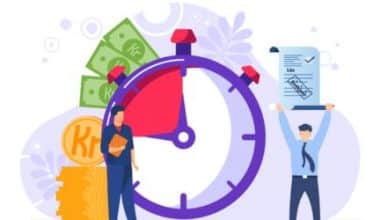If you are struggling with personal debt and have poor credit, trying to get your finances back on track can feel overwhelming. However, a solution can help you manage your debt more effectively: debt consolidation loans. These loans allow you to combine all your existing debts into one manageable payment, potentially reducing your overall interest rates and making it easier to stay on top of your finances. If you have bad credit, there are still options available to you for the best debt consolidation loans for bad credit. By taking advantage of these loans, you can take control of your finances and work towards a debt-free future. This article will guide you through personal loans and the top debt consolidation loans. Read on to learn more about how a debt consolidation loan works.
What Is a Debt Consolidation Loan?
A debt consolidation loan is a type of loan that allows you to combine multiple debts into a single, more manageable payment. Essentially, you take out a new loan to pay off your existing debts, such as credit card balances, personal loans, and medical bills. With a debt consolidation loan, you only have to make one payment per month instead of several payments to different creditors. Potentially lowering your overall interest rates and making it easier to keep track of your finances. This can be a useful tool for individuals who are struggling to pay off their debts. You can use a debt consolidation calculator to estimate your interest savings and new monthly payment and to compare various loan options.
What Loans Are Eligible for Consolidation?
Consolidation loans are intended to make debt repayment easier by merging various loans into a single payment. Not all loans, however, are eligible for consolidation. Here are a few that are eligible for consolidation:
- Credit card debt
- personal loans
- medical bills
- payday loans
Credit card debt is a typical sort of debt that might be merged due to the high-interest rates that credit cards frequently hold. Personal loans and medical expenses are other unsecured obligations that can be merged with a debt consolidation loan. Payday loans may potentially be eligible for consolidation, but be cautious because these loans frequently have excessively high-interest rates. Before applying for a consolidation loan, you should assess your existing debts to see which ones qualify and whether consolidation is the best option for you.
What Is a Consolidation Loan and How Does It Work?
If you’re struggling with personal debt, a debt consolidation loan could be the answer. Consolidation loans, often known as the best debt consolidation loans for bad credit, function by merging several debts into a single payment, such as credit card balances, medical bills, and personal loans.
These loans often have lower interest rates, making it easier to pay off your bills more quickly and efficiently. You won’t have to worry about keeping track of several payments because you’ll only have one to make each month. Before applying for a consolidation loan, you should evaluate your current debts and decide whether consolidation is the best option for you. You can simplify your debt repayment and work toward a debt-free future with the help of a consolidation loan.
Can I Get a Consolidation Loan From My Bank?
Your bank is one option to examine if you want to get a consolidation loan. Many banks include consolidation loans among their lending options, which might make the application process easier if you’re already a customer. It is crucial to note, however, that your eligibility for a consolidation loan will be determined by a variety of variables. This may include your credit score, income, and debt-to-income ratio. Furthermore, when it comes to consolidation loans, some banks may have special restrictions or limitations such as a minimum loan amount or a maximum number of debts that can be aggregated.
It’s a good idea to browse around and compare offers from different lenders before applying for a consolidation loan from your bank. This is to ensure you’re getting the best bargain. You may also want to consider consulting with a financial advisor or credit counselor to help you make an informed decision and establish a debt-reduction strategy.
Do All Banks Do Debt Consolidation Loans?
Although many banks provide consolidation loans, not all do. Some banks may specialize in certain types of lending products, whereas others may not offer any type of consolidation loan at all. If you want to get a bank consolidation loan, you should look into different lenders to see what products they provide and whether you fulfill their eligibility conditions. Consider working with a financial advisor or credit counselor to help you understand the application process and locate the best loan for your needs.
Keep in mind that consolidation loans aren’t for everyone. It’s critical to assess your current obligations and financial condition before applying. With careful thought and study, you may discover the right consolidation loan and begin the process of becoming debt-free.
How Many Years Is a Consolidation Loan?
The term of a consolidation loan varies according to the lender, loan amount, and your specific demands. Consolidation loans are typically available with repayment lengths ranging from two to seven years. Some lenders may provide longer or shorter terms based on their rules. When applying for a consolidation loan, you should carefully analyze the duration of your loan term. Because a longer term may result in lower monthly payments but ultimately higher overall interest expenses.
Furthermore, some lenders may provide repayment flexibility, such as the ability to make extra payments or pay off the loan early without penalty. It’s a good idea to explore numerous lenders and compare offers before applying for a consolidation loan to discover the loan with the best terms for your circumstances.
What Is a Disadvantage of Debt Consolidation?
One important disadvantage of debt consolidation loans is that they do not always lessen your overall debt burden. If you’re not careful, you can end up paying more in interest over the life of the loan than you would have if you hadn’t borrowed in the first place.
Furthermore, consolidation loans may require you to put up collateral. The collateral, such as your home or car, which can jeopardize your assets if you fail to repay the debt. Finally, debt consolidation loans may not address the underlying reason for your debt troubles. However, overspending or a lack of budgeting skills, might lead to additional financial problems in the future. Before obtaining a consolidation loan, you should carefully analyze the potential negatives and confirm that this option is the best fit for your specific demands and financial condition.
What Happens After Loan Consolidation?
Following loan consolidation, you will begin making payments on your new consolidation loan rather than your previous debts. Ideally, this will stretch your monthly budget and make keeping track of your payments easier. However, it is critical to continue making your payments on time and in full, as late payments can harm your credit score and cause more financial problems.
You may also want to make efforts to avoid incurring extra debt in the future. This could be such as setting a budget, eliminating unnecessary purchases, and saving for an emergency. You can stay on track and achieve your financial objectives in the long run if you take a proactive approach to managing your finances.
The Best Debt Consolidation Loans for Bad Credit
The following are some examples of debt consolidation loans for people with Bad credit:
#1. Achieve
Achieve is a lending platform that focuses on lending to those with bad credit. They provide debt consolidation loans with fixed interest rates and no prepayment penalties. It makes it simple to get out of debt rapidly. The loan application process at Achieve is simple and quick, and borrowers can get funds as soon as the next business day after approval.
#2. Upstart
Upstart is an online lender that offers loans to individuals with poor credit or limited credit histories. Their loan approval process is based on a proprietary algorithm that takes into account factors. This is beyond just credit scores, such as education and work history. Upstart offers debt consolidation loans with fixed interest rates and flexible repayment terms. It makes it easy to find a loan that fits your budget.
#3. Upgrade
The enhancement is an online lending platform that provides debt consolidation loans to those with bad credit. They provide fixed-interest loans with no prepayment penalties, making it simple to pay off your bills quickly. It also provides a credit health monitoring tool that allows you to track your credit score and discover areas for improvement.
#4. LendingPoint
LendingPoint is a lender that specializes in lending to those with bad credit. They provide debt consolidation loans with fixed interest rates and no prepayment penalties. This makes it simple to get out of debt rapidly. LendingPoint also provides a free credit score check as well as a customer loyalty program that might save you money on future loans.
#5. Avant
Avant is a lender that offers loans to individuals with poor credit or limited credit history. They offer debt consolidation loans with fixed interest rates and flexible repayment terms. This makes it easy to find a loan that fits your budget. Avant’s loan application process is quick and easy, and borrowers can receive funds as soon as the next business day after approval. They also offer a mobile app that can help you manage your loan and payments on the go.
FAQs
Is debt consolidation bad for your credit?
Debt consolidation loans might have a negative impact on your credit, but it is only temporary. When you apply for a debt consolidation loan, the lender will run a credit check. This will result in a hard inquiry, which may reduce your credit score by 10 points.
Is a debt consolidation loan a good idea?
If you get a good loan, debt consolidation may help you. If your new loan has a lower interest rate than your old loans and credit cards, you can reduce your total debt cost.
What is the minimum credit score required for a consolidation loan?
Debt consolidation loans with low-interest rates usually require a credit score of 580 to 680.
Related Articles
- BEST DEBT CONSOLIDATION LOANS FOR BAD CREDIT IN 2023.
- Debt Consolidation Loans: Best Debt Consolidation Loans & Companies Updated!!!
- The Benefits of Using a Credit Card Consolidation Loan to Pay Off High-Interest Debt
- The Benefits of Using a Credit Card Consolidation Loan to Pay Off High-Interest Debt
- STUDENT LOAN CONSOLIDATION: Meaning, Rates & How to Do It
- HOW TO CONSOLIDATE STUDENT LOANS: Requirements and Detailed Guide






